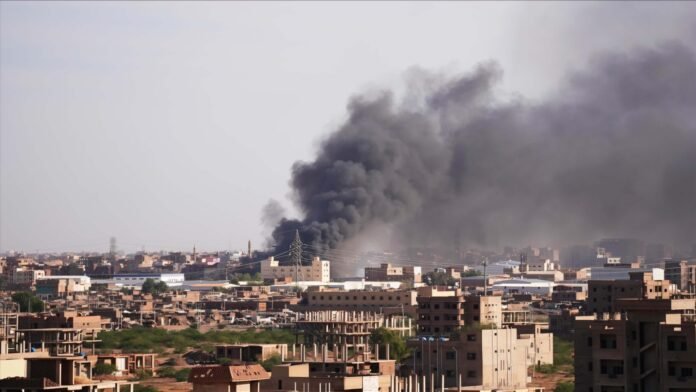As Sudan’s armed conflict rages on since the outbreak of war in April 2023, the humanitarian catastrophe has escalated to unprecedented levels—particularly in displacement zones and refugee camps that have become epicenters of compounded crises, from indiscriminate aerial bombings and the spread of epidemics to the looming threats of extremist armed groups allied with the army.
Amid the total collapse of state institutions, healthcare centers are unable to cope, while displacement camps face not only cholera outbreaks but graver threats: the use of prohibited weapons, an upsurge in drone strikes, and the rampant influence of ideologically driven militias operating within army alliances.
Systematic Bombardment by Turkish Drones
According to local and international human rights sources, the Sudanese army has increasingly relied on Turkish-made Bayraktar TB2 drones to launch airstrikes on populated areas, killing hundreds of civilians—many inside displacement camps.
An international relief official, speaking on condition of anonymity, said:
“The army is using Turkish drones indiscriminately, targeting sites inside and around the camps, leaving displaced civilians trapped in crossfire.”
He added that “these attacks are often coordinated with ground operations led by hardline Islamist battalions linked to the former security apparatus.”
Camps at the mercy of extremist militias
At the same time, concerns have grown over the influence of extremist ideological armed groups operating under the army’s protection, accused of committing abuses against civilians in displacement zones.
Several anti-war groups and peace mediators have accused Al-Burhan of ruling through extremist militias — some allegedly linked to jihadist factions — that exert control over camps in Darfur and Kordofan through violence and intimidation.
Reports by Human Rights Watch confirm that some of these allied militia groups – operating under army-aligned movements – are implicated in forced displacement, extrajudicial killings, and using civilians as human shields.
ALSO READ: Intensified clashes in El Fasher amid deepening humanitarian crisis
Cholera and chemical weapons: A compound crisis
While agencies have reported cholera outbreaks in displacement camps—as documented by the Displaced Persons Coordination Committee—medical sources suspect that some cases stem from chemical poisoning.
A volunteer in Omdurman said on May 24:
“What’s happening is not a natural cholera outbreak; it results from leaks of chemical weapons used by the army.”
This suspicion is reinforced by the US State Department reports in 2024 and 2025 confirming the Sudanese army’s use of chemical weapons. These findings prompted Washington to impose sanctions last May, including export bans, financing restrictions, and a credit freeze on Sudan’s government.
State Department spokesperson Tammy Bruce urged:
“We call on the Government of Sudan to cease the use of chemical weapons and comply with international treaties,” warning of harsher sanctions should the army fail to comply with the order.
Al-Burhan and the Army Under International Scrutiny
Political analyst Omar Mohamed Al-Nour argued:
“These crimes, from chemical weapon use to indiscriminate bombings, prove that Abdel Fattah al-Burhan is following in Omar al-Bashir’s footsteps.”
He warned that the army has become “a tool to impose an ideological project fueled by Turkish and Iranian support,” echoing patterns seen during the al-Bashir regime, as highlighted by the Washington Institute.
For Al-Nour, the problem lies in the military institution itself, necessitating comprehensive restructuring to restore professionalism and neutrality. Without reform, “Sudan is heading toward full-scale Somalization.”
Calls for International Intervention
In London, Sudanese activists staged a protest demanding an international investigation into Sudan’s violations. Wearing protective yellow suits and masks, they held banners calling for the protection of children and displaced persons, declaring:
“International silence is complicity in the crime.”
Conclusion
Between Turkish bombardments, prohibited weaponry, and extremist militias, Sudan’s displacement camps have become open targets in a war showing no regard for law or human life. Without decisive international action, the catastrophe will deepen—and the tragedy will become a documented crime witnessed in real time.

